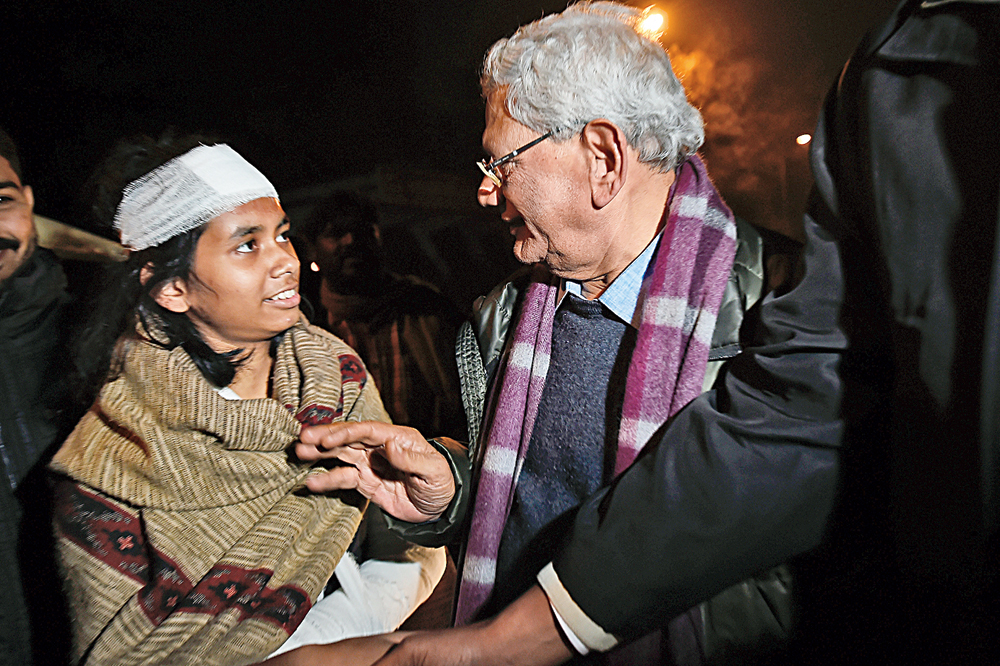When the masked thugs were beating up students and teachers between 6.30pm and 9pm in and around Sabarmati Hostel of JNU on Sunday, the varsity administration appears to have been preoccupied with a seemingly pressing matter.
Two complaints were filed by the JNU administration against several students for alleged transgressions that took place a day earlier and four days earlier.
Soon after, the complaints were converted into first information reports (FIRs) by the Vasant Kunj (North) police station. The FIRs record the time of receiving the complaints as 8.39pm and 8.43pm.
The students named in the two FIRs include Aishe Ghosh, the JNU students’ union president who was hit on her head around the same time the complaints were filed at the police station. She suffered iron-rod blows so vicious that the gash required 16 stitches.
The two complaints filed by the university are for the vandalism of the communication and information services centre of JNU on January 1 and January 4. Some students allegedly disconnected the Internet, clashed with guards and damaged equipment to prevent online registration for the upcoming semester, which they are boycotting to protest a hostel fee hike.
Eight students are named in the first FIR and 21 in the second one. Both have Ghosh’s name. The complainant is a security officer of JNU.
Delhi police, however, have not listed the students as “accused” yet.
On Tuesday, a drone monitored a meeting of students and teachers — and later attended by actress Deepika Padukone — on the JNU campus. Such gadgets were not pressed into service when the masked goons had walked in and out of the campus with impunity and gone on the rampage.
On January 6, a day after the Sunday rampage, the police registered a separate FIR for rioting against unknown persons, based on information filed by an inspector, Anand Yadav.
This FIR says information about clashes near Periyar Hostel was received at 3.45pm and about the attack on Sabarmati Hostel at 7pm. In between these two incidents, the university gave the police permission to enter.
This contradicts the police’s statement on Monday that the varsity gave them permission only around 7.45pm. None of the miscreants has been named or caught.
Asked when the university had complained to the police about Sunday’s mayhem and the previous incidents of vandalism and violence, JNU vice-chancellor M. Jagadesh Kumar told a news conference on Tuesday: “How does it matter whether the complaint is submitted at 7.05 or 7.07? It doesn’t matter. It is a process. Let’s not split hairs and say whether it was submitted at 7 o’clock or 8 o’clock.”
Kumar is yet to meet the injured students or teachers. Asked if he planned to do so in the future, the vice-chancellor replied: “Whenever such incidents happen, sometimes if students are on the campus, the wardens, senior wardens they do enquire about their welfare. In the case of teachers or any other staff members, if anything happens, appropriate help is always provided.
“Whenever they seek for any help, we do provide that help…. We always want to meet anybody. Our office is always open. Our faculty members, our students… we regularly meet. We are open for meeting any of our stakeholders in the university.”
Kumar added that the university had asked for more funds from the UGC in lieu of utility and service charges for hostels to be waived for students.
The varsity has given a report to the human resource development ministry on the violence. He added that a committee would look into “whatever has happened and bring the facts to the front”, and appealed to students who have left out of fear to return to their hostels.
During the day, a group that calls itself the “Hindu Raksha Dal” took responsibility for Sunday’s attack on the campus. A man who identified himself as Pinki Chaudhary made some claims but they were seen as a diversionary tactic.











